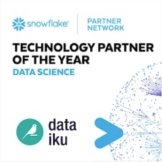Effective marketing campaigns engage consumers through individualized messaging, but generating individualized messaging is time consuming and challenging, ultimately increasing the sales acquisition cost. With Dataiku, you can use an Generative AI — more specifically a large language model (LLM) — to automatically generate tailored emails fueled by product recommendation scores and consumer data, increasing the sales conversion rate and reducing the time spent developing effective email campaigns.
Feature Highlights
- Scalable & Transparent: Dataiku processes customer lists and recommendations in batches, increasing the scale of reach of marketing teams while also giving the flexibility to look at specific messages for individual customers.
- Reduce Cost: Maximize sales and marketing resources through increased productivity and efficiency.
- Tailored Messaging: Individual customers receive tailored “recommended products” via AI-generated emails.
- Customizable: Sales and marketing team users can interact with the model, giving it instructions in natural language — even by voice — to refine the email for each segment and fine-tune as needed.
How It Works: Architecture
Build product affinity scores for each customer in Dataiku from retail shop data and online marketplaces like historical transactions, similar customer purchases, etc. The predictive scoring is delivered by a machine learning model trained on this data after pre-processing. The company can select the desired infrastructure for running the model: on-premise, private cloud, or managed cloud.
Customer-specific messaging is generated for each piece of clothing that might be recommended (the messaging can be adjusted depending on the customer segment). The user can input a short description of each product or generate it automatically from the picture using an LLM.
Email campaigns are designed for target customer segments, defining the specific style and wording of the template email. The user can edit the template email through raw text instructions or by voice. The user can also fine-tune the email by editing it manually.
For each customer, the “best recommended products” are inserted in the placeholders generated in the template. The user can navigate through a set of these customer emails to check the final look of the emails.
Responsibility Considerations
Customer data can contain sensitive information. In the example design, no personal information is sent directly to the LLMs, and the emails are created from an LLM-generated template. Using a containerized version of the LLM with full certification from a chosen cloud provider would be vital to guaranteeing corporate data privacy.
Parameters for text generation should be carefully reviewed to ensure toxic or polarized language is not present and that customer demographics/segments are not used to influence the generated text in a harmful way (for example, “single parents love this style”). The application is designed to have a human in the loop, meaning the marketing professional has final oversight of the message content before sending it to the customer.
Other recommendations for the responsible use of an LLM to generate personalized messaging:
- The product recommendation system should be audited to ensure it makes predictions free of bias — Dataiku makes this simple with explainable AI features.
- The product recommendation model should output explanations for every recommendation, which can be used to further enhance the marketing message.
- The organization should have an overarching Responsible AI policy, which should be enforced with both the baseline product recommendation model as well as the LLM generating email templates.
- End users should have a feedback mechanism to flag incorrect or harmful language.





